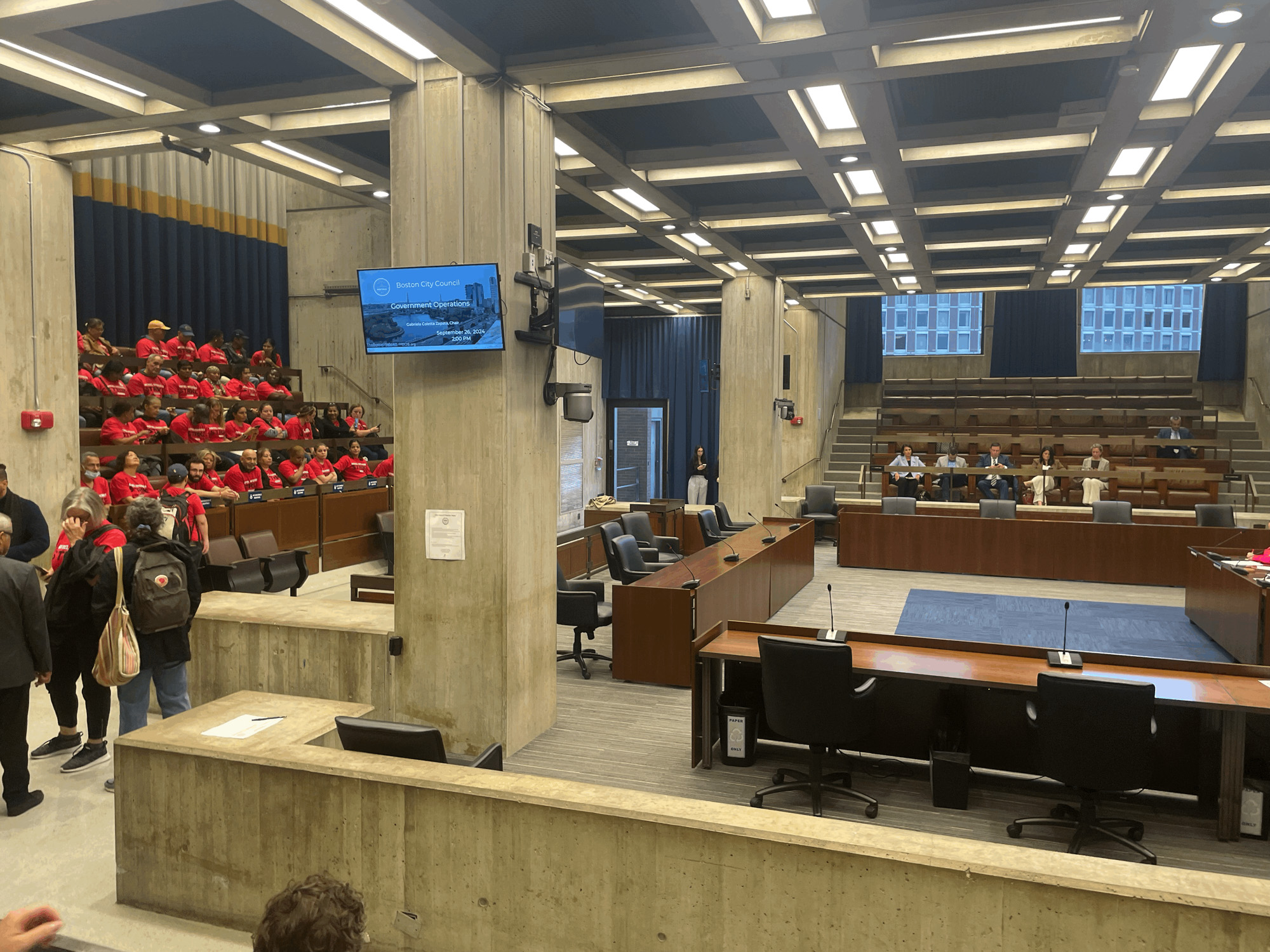City officials deliberated a public health and safety ordinance for hotels on Sept. 26 after workers went on strike at four additional Boston hotels in the third wave of citywide strikes in the past month.

Nearly 1,200 workers at the Omni Parker House, Omni Boston Seaport, Renaissance Boston Seaport and Westin Boston Seaport hotels went on strike on Sept. 19, according to a press release from UNITE HERE Local 26. This was the third and largest surge of hotel worker strikes by the union thus far.
Mina Miller, a phone operator at the Omni Boston Seaport, said the picket line of about 500 workers amassed heavy attention throughout the course of the strike.
“We were the loudest group for all three days, which I think is a testament to our frustrations,” she said.
UNITE HERE Local 26 represents 12,000 hospitality workers across Massachusetts. The union is currently negotiating contracts for over 30 hotels employing approximately 5,000 workers throughout Greater Boston.
Negotiations between Local 26 and hotel management began in April. After months of standstill, the workers authorized a strike in September with a 99% vote.
Carlos Aramayo, president of UNITE HERE Local 26, said the union is looking for significant wage increases and pension enhancements in their new contract.
“Many of our workers who would retire cannot afford to, forcing them to work into their 70s or sometimes 80s,” Aramayo said.
Aramayo said he recognizes the importance of ensuring job stability for these workers, especially the need to know that they’ll be able to keep these jobs in the future.
The workers’ most recent contract expired on Aug. 31, which left workers uninformed throughout September about the stability of their employment.
Miller said members of Local 26 are dedicated to their jobs and would prefer to keep working for the hotels, but they require better conditions to do so. She said workers want “a good contract that gives us better pay, better pensions and better terms and agreements for our healthcare.”
“We’re requesting something that is very doable,” Miller said. “We’re going to do everything we can to get the contract we deserve.”
The strike has gained the attention of the local government.
City Councilors Henry Santana, Gabriella Coletta Zapata and Sharon Durkan were the original co-sponsors of a public health and safety ordinance for Boston hotels, which they presented at a hearing with the City Council Government Operations Committee hearing on Sept. 26.
Local 26 union members, councilors, community members and both local and nationwide hotel representatives filled a large conference room in Boston City Hall to discuss the ordinance.
Santana was the lead sponsor of the ordinance, which would protect hotel workers who are confronted with dangerous situations, such as substance abuse incidents or health hazards.
“At its heart, this ordinance is about safeguarding hotel workers, workers who face risk far beyond what many of us might imagine,” Santana said.
Durkan said the ordinance “strikes a careful balance” by providing an 180-day implementation period while facilitating compliance through a licensing renewal cycle. The flexibility will give hotels and workers “time to adapt” to the new regulations.
“I commit to ongoing dialogue with stakeholders to ensure this ordinance achieves its intended goals without placing undue burdens on our hospitality industry,” she said.
UNITE HERE Local 26 members Susana Coelho and Aissata Seck, who work at Hilton Boston Logan Airport and Hilton Boston Park Plaza respectively, were also present at the meeting and spoke on the ordinance.
Coelho, who works as a phone operator at the Hilton Boston Logan Airport, said the security team at the hotel has shrunk in the past couple years.
A study conducted by the City of Boston between 2022 and February 2024 found Boston Police Department responded to 1,690 incidents at Boston hotels, and Boston Fire Department responded to 1,465 calls, according to Coelho. The number of calls between 2022 and 2023 regarding such incidents increased by 18% for BPD and 12% for BFD.
“A majority of these calls fall in areas where hotel staff could be trained to respond prior to first responders arriving,” Coelho said. “I believe there is certainly more room to help improve the safety and well-being of the traveling public.”
UNITE HERE Local 26 fully endorsed the precautions and safety procedures that would be introduced by the ordinance.
Conversely, hotel associations were more critical of the ordinance.
Chris Pappas, president and CEO of the Massachusetts Lodging Association, said the proposed ordinance “may have unintended consequences” for hotels and workers, including harm to the city’s economy and the increase of financial burdens on the hotel industry.
“The lodging industry provides meaningful, career-driven job opportunities for many of our citizens … and when our workers thrive, our industry thrives, Boston thrives,” Pappas said.
Aramayo said the union workers are prepared “to keep at it in the streets” as negotiations carry on until they reach a negotiated settlement that meets their “core demands.”
“You can see from the extraordinary participation we’ve had in the three strikes that have happened in the last three weeks that our members are certainly willing to do whatever it takes to achieve those demands,” Aramayo said.




















































































































